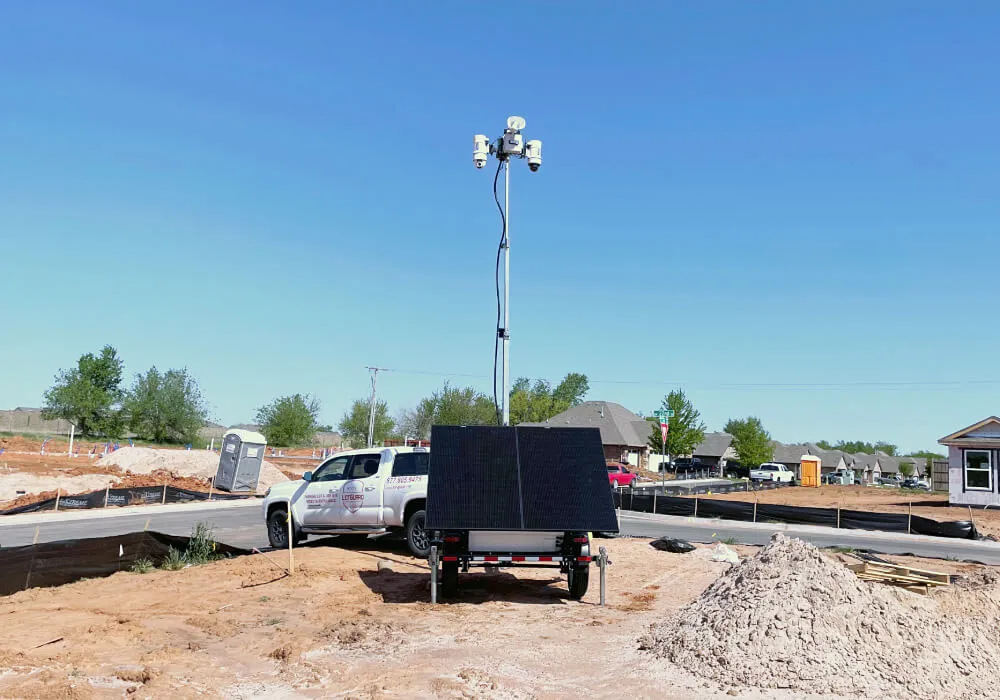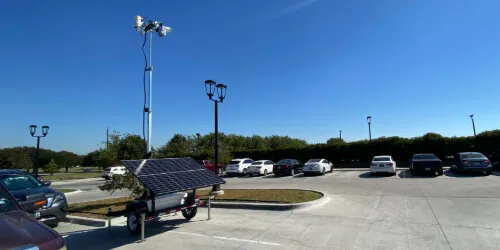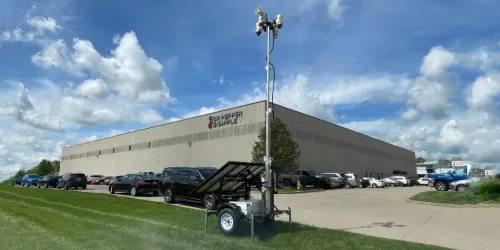We explore the top features of Solar Surveillance Trailers and outline why they are indispensable for temporary or off-grid security requirements.
What Are the Key Features of Solar Surveillance Trailers?
If you're looking for a temporary security solution for your construction jobsite, or a system to provide targeted surveillance at an off-grid location, then your research has likely led you to Mobile Solar Surveillance Trailers.
By operating independently of power and internet, and removing the need for a structure to mount security cameras, Solar Surveillance Trailers have become the security solution of choice for industries ranging from Law Enforcement to Solar Farms and Auto Dealerships.
As with any rapidly emerging technology, the marketplace for Solar Surveillance Trailers is not short on choice, so how do you separate the market leaders from their cheap imitations?
To help those considering Solar Trailers with making a confident and well-informed decision on the supplier to use, we have compiled a checklist of the top features to look out for and why they matter.
What is a Mobile Solar Surveillance Trailer?
Essentially, the clue is in the name: Mobile Solar Surveillance Trailer. These systems combine surveillance camera technology and solar panels mounted to a moveable trailer base.
The units will be equipped with solar panels that power internal batteries, one or more security cameras fixed to the top of a raised mast, and a range of additional security devices such as voice-down audio, sirens, alarms, and flashing lights.
This combination of features allows Mobile Solar Surveillance Trailers to be quickly deployed to any location that requires temporary or targeted security coverage but lacks the power and/or internet facilities to support fixed security cameras.
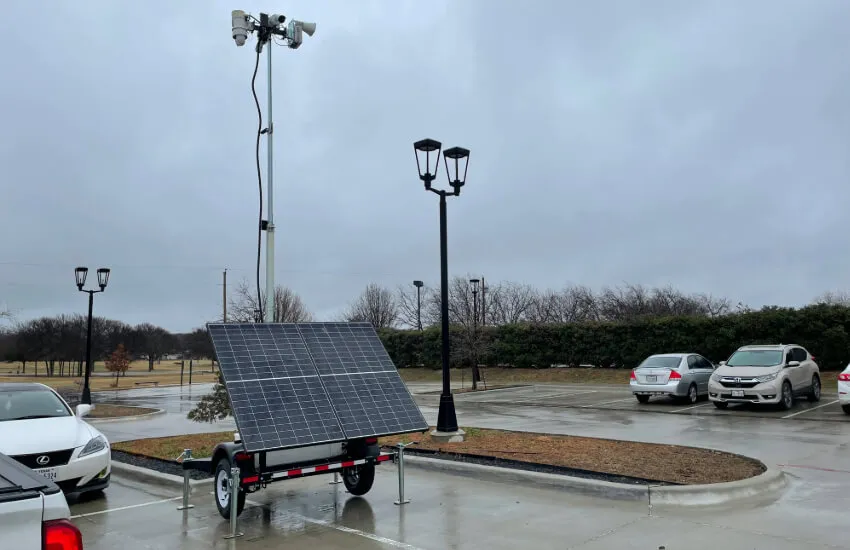
Solar Surveillance Trailer Top Features
Below are the main features that set Mobile Solar Surveillance Trailers apart from other security solutions.
It is recommended for optimal security that these 8 features should be involved as a minimum requirement:
High-Quality Security Cameras
The primary purpose of a Solar Surveillance Trailer is to protect your site, building, or land from their associated security risks, and to record live video evidence in instances where an incident has taken place.
The cameras utilized on the top of the Solar Trailer’s mast provide both detection and documentation to protect your site as needed.
The specification, quality, and number of cameras will vary between manufacturers, but every Trailer will have at least one camera fitted.
We offer up to 4 cameras to be attached to our Surveillance Trailers to provide you with the best security coverage.
There are some key features to look out for and these are as follows:
- Video Resolution:
It is recommended that you choose a Trailer with a high-definition camera to help accurately detect and identify activity. Key terms to be aware of regarding camera resolution include 4K and 1080p, both of which indicate extremely high-quality video recording capabilities. - PTZ Control:
PTZ stands for Pan, Tilt, and Zoom, which refers to the camera's ability to be remotely controlled and pointed in the most optimal direction for maximum security coverage. Being able to change the position of the camera remotely is vital in locations with multiple security vulnerabilities or where the environment may change. - Day/Night Operation:
The vast majority of criminal activity at construction jobsites and parking lots happens at night, so it is essential that the cameras can operate in low (or no) light situations. For this, you need to be looking for cameras that feature infrared (IR). - Remote Access:
If you're managing a property, monitoring a jobsite, or conducting a Law Enforcement investigation, you're going to want to access your cameras wherever you are. Some cameras will offer access via Wi-Fi, which limits you in terms of where you need to be to access your videos. Other systems will offer cellular connectivity, meaning you can access your cameras anytime from anywhere.
Reliable Autonomous Solar Power
If the security cameras are the brains of the solar trailer, then the solar power is the beating heart of the solution.
Solar Surveillance Trailers offer autonomous power alongside wireless security cameras, eliminating the need for external power sources.
This is what allows them to be deployed to off-grid locations, places where standard security cameras can't reach, or as a plug-and-play solution for temporary surveillance needs.
Key features to look out for:
- High-Capacity Solar Panels: Not every day is going to be wall-to-wall sunshine, so your Solar Trailer should have a solar panel that can maximize energy generation even on cloudy days.
- Battery Back-Up: On days of limited sunlight, the battery backup system will keep the Trailer fully operational. You should make sure the Trailer you use has long-run, environmentally-tested batteries so you don't get caught short.
- Power Management: A power management system will maximize energy usage and feature a control panel that provides vital insight into battery performance. They allow you to keep an eye on runtime and trigger an alarm when power is running low.
Discover Our Solar Surveillance Trailers - https://www.wcctv.com/products/solar-surveillance-trailers/
Easy Deployment and Mobility
The third and final core piece of the Solar Surveillance Trailer jigsaw is the rapid deployment capability and portability delivered by the unit itself.
Solar Surveillance Trailers are typically incredibly easy to deploy, taking one person less than 20 minutes to set up. This means users can respond quickly to emergency situations and easily relocate the unit if surveillance priorities change.
Most of them can be fitted to a vehicle and transported with ease.
The main features to keep in mind are:
- Tool-Free Setup: You should be able to deploy a Solar Surveillance Trailer without needing any specialized tools for onsite assembly or configuration.
- Compact Design: The Trailer should be easily collapsible and streamlined for vehicular transportation.
- Towing Arm: The Trailer’s base should have a built-in tow bar hitch to hook it to any suitable vehicle.
- Adjustable Mast: A Solar Surveillance Trailer should have a telescopic mast that can easily be raised, lowered, and rotated to achieve optimal camera positioning.
- Plug-and-Play Simplicity: The Trailer should essentially be a drop-and-go system that is fully pre-configured with no onsite assembly required.
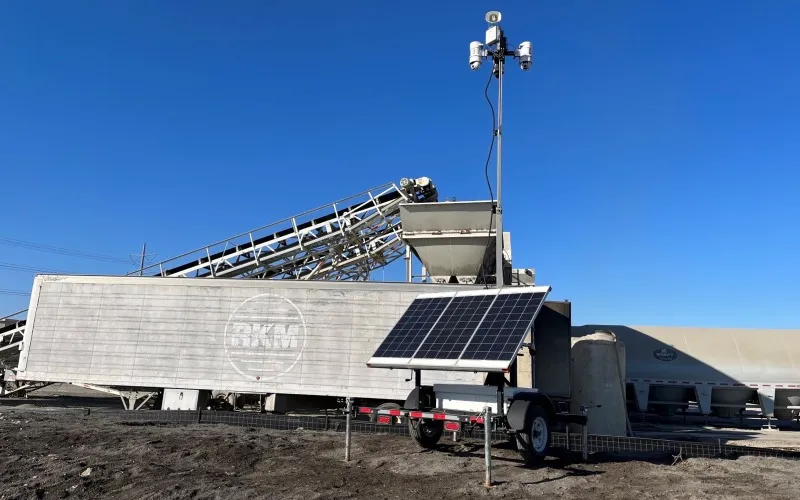
Intruder Detection Capability
We now move into features that go beyond the physical makeup and basic components of the Solar Surveillance Trailer, and onto the advanced capabilities that separate the high-quality units from the more basic models.
The variety of use cases for Solar Surveillance Trailers is growing all the time, but they are still most typically deployed for security purposes, at a construction jobsite or parking lot, for example.
Intruder detection capabilities are critical security features that help protect sites from trespassing, theft, and vandalism. An effective Mobile Solar Surveillance Trailer should have this capability built in.
Detection can either be triggered by motion sensors or, more effectively, by advanced AI-driven video analytics.
Features to look out for are:
- Video Analytics: AI-powered video analytics software is ideally suited to intruder detection applications as it can intelligently distinguish human activity compared to false alarm situations, such as animals or trash blowing in the wind. Some surveillance cameras feature edge-based video analytics, while others can process video feeds through third-party software.
- Automated Crime Response: When an intrusion or other potential crime threat is detected, it should automatically trigger a remote crime prevention process that includes an alert to a video monitoring station and physical response such as sirens, audio alerts, and the dispatch of local Law Enforcement.
- Live Video Verification: When the video analytics determines an intrusion is taking place, a remote operator should be able to access the cameras in real-time to verify the event as genuine. Technology is advancing at a rapid rate, but it's always advisable to have a human determine whether the threat is real.
Environmentally Tested
Whatever deployment scenario you require a Mobile Solar Surveillance Trailer for, it will almost certainly be an outdoor application.
That means your Trailer will be subject to variable weather conditions, from snow, wind, and rain right through to blazing hot sun.
To ensure your Trailer can perform no matter what weather conditions it faces, you need to ensure it has been built to the highest standards and is proven to withstand the USA's weather extremes. Ideally, to avoid any nasty surprises, you may want to use a Trailer that has been made in America.
Key features to look out for:
- Weatherproof Enclosures: Your Trailer needs to be constructed in a way that protects all electrical components from dust, rain, and high temperatures.
- Durable Materials: To ensure your trailer can operate year-round outdoors, look for one made from high-quality materials such as stainless steel, reinforced aluminum, and UV-resistant plastics.
- Corrosion Resistance: Sun and rain can damage a Solar Trailer, so you need to ensure the one you plan to deploy has protective coatings and finishes that help prevent corrosion, rust, and UV damage.
- Tamper Proof: Another extremely handy feature of high-quality Surveillance Trailers is that they are reinforced to protect against malicious interference from individuals hoping not to be recorded.
Remote Video Monitoring
As we mentioned above, no matter what your security or surveillance needs are, you will more than likely want to be able to access your cameras on demand.
Whether you want to check in on the progress of your jobsite, keep watch over major public events, or coordinate a tactical response, being able to connect tour cameras at any time of day or night from any location should be a minimum feature of a Surveillance Trailer.
Some Solar Trailers offer remote access via a mobile app or desktop software, while others send the camera feeds directly to a video monitoring station, where security professionals monitor your site 24/7.
There should be no reason, though, why you can't have both - surveillance camera access in the plan of your hands and a team of professionals keeping watch when you can't.
Features to consider regarding remote video monitoring and remote access:
- Cellular video transmission:
When combined with solar power, cellular transmission allows a surveillance solution to be completely autonomous. It allows you to cut the cords of reliance on power and internet hookups and bring video surveillance coverage to practically any location with zero limitations. Trusting your surveillance setup to a cellular transmission expert with a solid pedigree in delivering video over wireless networks is a significant value add, too. - Mobile App:
The ultimate in mobile surveillance is accessing your cameras on-the-go. This gives you complete flexibility over both where you deploy the camera units and where you can view them. Look for a supplier who can provide you with a mobile app for all operating systems. - Video Storage:
Not every incident can be dealt with solely through live footage or video snapshots. Your Surveillance Trailer should provide you with a full video archive of at least 30 days for a retrospective review of any incidents. - Remote Crime Prevention:
You should be able to send video feeds to a remote video monitoring station that can undertake a number of remote crime prevention protocols, such as issuing live audio warnings and dispatching Law Enforcement. - Integration Pathways:
This is particularly important if you are Law Enforcement or a Government department with an existing camera network operating via a Video Management System. Seek out a trailer manufacturer who can integrate with your existing video platform and allows you to manage all your cameras from one system.
Budget-Efficiency
With so many advanced features and benefits, you're probably wondering if a high-tech surveillance system like a Mobile Solar Surveillance Trailer comes at a high cost too.
While the purchase price of a Solar Surveillance Trailer can seem expensive, the cost benefits these solutions deliver make them one of the most budget-efficient solutions.
One way to demonstrate the value of a Surveillance Trailer is to compare the cost of hiring a trailer to the cost of other security alternatives, such as security guards.
The cost of renting a Surveillance Trailer per month will typically range from $1,200-$2,500, versus the cost of hiring a single security guard at $4,000-$6,000 per month.
This analysis only allows for the hire of one security guard, too. Consider that a Trailer can see and detect criminal activity over a greater distance than two or more guards, and you can understand exactly why these solutions are so popular.
It's not just guards that Solar Trailers compare favorably with, though. With zero installation costs and no construction work required, using a Surveillance Trailer is significantly more cost-effective than installing fixed cameras.
Key features to look out for:
- Service and Support:
One of the benefits of using a reputable, US-based business for your solar trailers is that you will receive ongoing support for your deployments. Whether it's training, tech support, maintenance, or just having someone on the other end of the phone who knows what they're talking about, a good service model will help you maximize your investment in Solar Surveillance Trailers. - Zero Maintenance:
Not having to maintain and repair a Surveillance Trailer continually will help keep costs low, so again, it's super important to use a highly-rated manufacturer or supplier. - Rental and Purchase Options:
You need to be able to choose a purchase model that best suits your needs, and your pocket. If you have short-term security needs, such as securing a construction jobsite, then renting a solar trailer absolutely makes sense. If you have a longer-term requirement, such as using a Solar Trailer within your police department, purchasing will probably deliver long-term cost savings. - Build Quality:
As with anything in life, you will absolutely get what you pay for when it comes to Solar Surveillance Trailers. Being penny-wise pound-foolish with your surveillance technology will only hurt you down the road, when the poor build quality of your cheap Trailer starts to lumber you with expensive repair or replacement costs. - Warranty Options:
Let's face it, no one likes paying for a warranty. It can feel like just another cost on top of what may already be an expensive period. However, having the option of a warranty can pay off significantly, and any manufacturer that provides a comprehensive warranty package is likely very confident in the quality of their product.
Physical Security Profile
At WCCTV, we live by the motto that it's better to prevent crime than record it. When it comes to protecting your site, we operate a four-step process: Detect, Deter, Document, and Dispatch.
A huge part of our success in defending sites and deterring criminals is the imposing physical presence of our Mobile Solar Surveillance Trailers.
Standing at 20 ft high and loaded up with additional features like audio-voice down units, horn speakers, flashing blue lights, LEDs, and alarms, criminals are left in no doubt they have been detected, and the wheels of justice are in motion.
Key features to look out for:
- Audio Capability:
The effectiveness of a live or even pre-recorded audio challenge cannot be overstated. When a criminal hears a piercing, live human address that they have been detected and are being tracked, they often very quickly rethink their plans. - Lights and Alarms:
Another layer of security, lights and alarms will startle an intruder and encourage them to desist. - Escalation Process:
Although the majority of intrusions will be deterred either by the presence of a Solar Trailer, or live audio warnings, some more persistent criminals may need handling differently. That's why it's handy to choose a Surveillance Trailer that comes with a fully-managed security package - with Law Enforcement or security dispatch as part of the overall solution.
Additional Considerations
Alongside the major features we have outlined above, there are other significant decision-making factors we would encourage you to look out for, including:
- NDAA-Compliant Cameras:
If you are a Federal agency, receive funding from the Federal Government, or want to do business with these organizations, you can only use a Surveillance Trailer that utilizes NDAA-compliant cameras. We recommend anyone who is concerned about the integrity and privacy of their video footage opt for NDAA-compliant cameras, whether they have to or not. - Remote Diagnostics:
It's critical that your surveillance equipment operates at optimal levels at all times. Any downtime in your system leaves your site completely vulnerable. Choosing a Surveillance trailer with a built-in diagnostics system that monitors both the power supply and the performance of the cameras provides absolute peace of mind.
Summary
Solar Surveillance Trailers continue to emerge as the most reliable, convenient, and cost-effective security solutions, but it's crucial to remember that not all are created equally, and researching the solution that offers the best balance of functionality and budget-efficiency is absolutely vital.
By reviewing the features we have outlined above, alongside the additional considerations we have outlined, you should be able to make a fully informed decision when weighing up your options.
If you would like any further information, or want to discuss a quote for renting or purchasing a WCCTV surveillance trailer, get in touch today.
FAQs About Mobile Solar Surveillance Trailer Features
Can Solar Surveillance Trailers be Used in Extreme Weather Conditions?
A high-quality solar surveillance trailer should be able to withstand any outdoor environment and operate in the harshest weather conditions. If you plan to deploy a trailer into a location prone to severe weather, be sure to choose one with weatherproofed enclosures and one that is made of durable material.
Are Solar Surveillance Trailers Easy to Relocate?
One of the main benefits of solar surveillance trailers is their portability and ease of installation. Most solar surveillance trailers will have a tow hitch allowing them to be transported from site to site, and the trailer base will have wheels and adjustable legs that allow it to be repositioned and a site develops or surveillance requirements change.
Can I Integrate a Solar Surveillance Trailer With My Current Security Setup?
Depending on which solar surveillance trailer you choose to deploy, you may be able to integrate the video feeds from the cameras with your existing video management software. This will vary from manufacturer to manufacturer, so it is important to check this prior to purchase, and run a proof of concept trial if needed.
